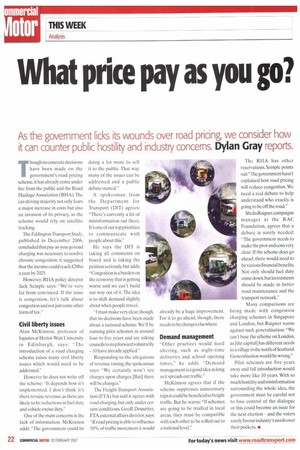What price pay as you go?
Page 22

If you've noticed an error in this article please click here to report it so we can fix it.
As the government licks its wounds over road pricing, we consider how it can counter public hostility and industry concerns. Dylan Gray reports.
Though no concrete decisions have been made on the government's road pricing scheme, it has already come under fire from the public and the Road Haulage Association (RHA)The car-driving majority not only fears a major increase in costs but also an invasion of its privacy, as the scheme would rely on satellite tracking.
The Eddington Transport Study, published in December 2006, concluded that pay-as-you-go road charging was necessary to resolve chronic congestion; it suggested that the income could reach £28bn a year by 2025.
However, RHA policy director Jack Semple says: "We're very far from convinced. If the issue is congestion, let's talk about congestion and not just some other form of tax.
Civil liberty issues
Alan McKinnon, professor of logistics at HeriotWattUniversity in Edinburgh, says: "The introduction of a road charging scheme raises many civil liberty issues which would need to be addressed."
However he does not write off the scheme: "It depends how it's implemented. I don't think it's there to raise revenue, as there are likely lobe reductions in fuel duty and vehicle excise duty."
One of the main concerns is the lack of information. McKinnon adds: -The government could be doing a lot more to sell it to the public. That way many of the issues can be addressed and a public debate started."
A spokesman from the Department for Transport (DfT) agrees: "There's currently a lot of misinformation out there. It's one of our top priorities to communicate with people about this."
He says the DfT is taking all comments on board and is taking the petition seriously, but adds: "Congestion is a burden on the economy that is getting worse and we can't build our way out of it. The idea is to shift demand slightly about when people travel.
must make very clear, though, that no decisions have been made about a national scheme. We'll be running pilot schemes in around four to five years and are asking councils to step forward voluntarily -10 have already applied."
Responding to the allegations of revenue raising, the spokesman says: "We certainly won't see charges upon charges. [But] there will be changes."
The Freight Transport Association (FTA) has said it agrees with road charging, but only under certain conditions. Geoff Dossetter, ETA external affairs director, says: "If road pricing is able to influence 10% of traffic movement it would Demand management "Other practices would need altering, such as night-time deliveries and school opening times," he adds. "Demand management is a good idea as long as it spreads out traffic."
McKinnon agrees that if the scheme suppresses unnecessary trips it could be beneficial to freight traffic. But he warns: "If schemes are going to be trialled in local areas, they must be compatible with each other to be rolled out to a national level. The RHA has other reservations. Semple points out:`"lhegovernment hasn't explained how road pricing will reduce congestion. We need a real debate to help understand who exactly is going to be off the road."
Sheila Raigner,canapaigns manager at the RAC Foundation, agrees that a debate is sorely needed: "The government needs to make the pros and cons very clear. If the scheme does go ahead, there would need to be various financial benefits. Not only should fuel duty come down,but investments should be made in better road maintenance and the transport network."
Many comparisons are being made with congestion charging schemes in Singapore and London, but Raigner warns against such generalisation: "We can't base the scheme on London, as [the capital] has different needs to a village in the north of Scotland. Generalisation would be wrong."
Pilot schemes are five years away and full introduction would take more like 10 years. With so much hostility and misinformation surrounding the whole idea, the government mustbe careful not to lose control of the dialogue or this could become an issue for the next election and the voters rarely favour industry's needs over their pockets. •
























































































































































































